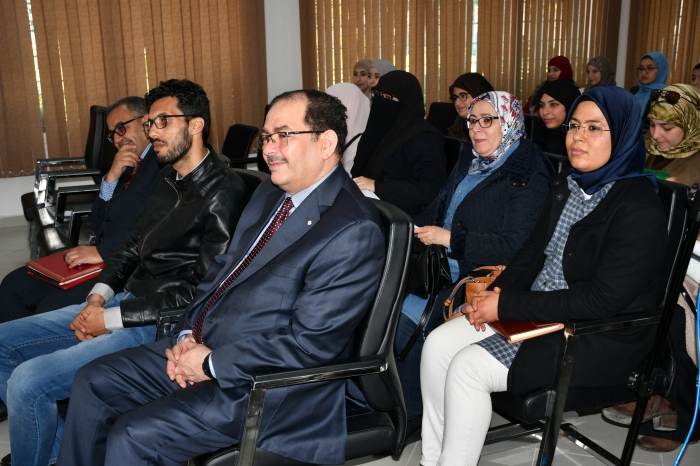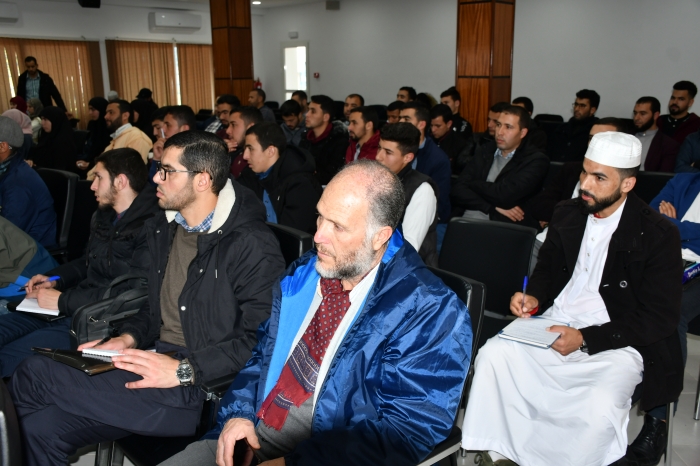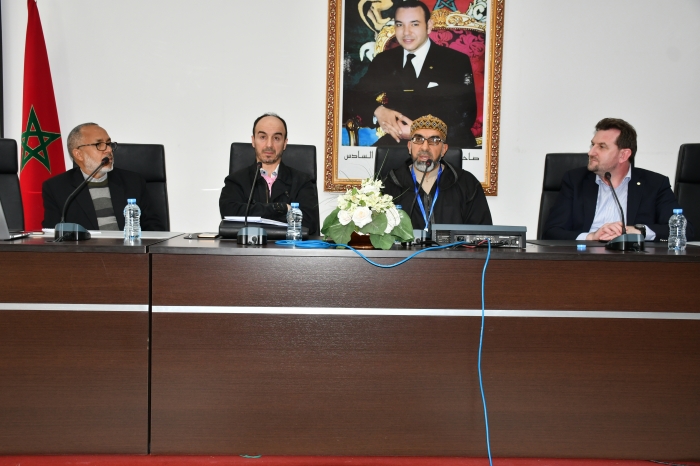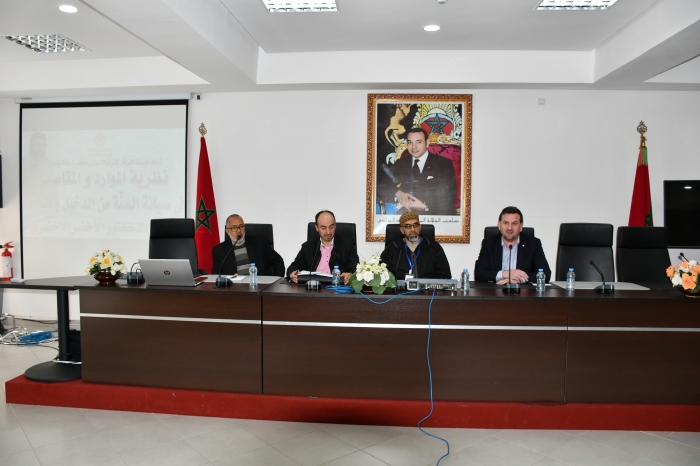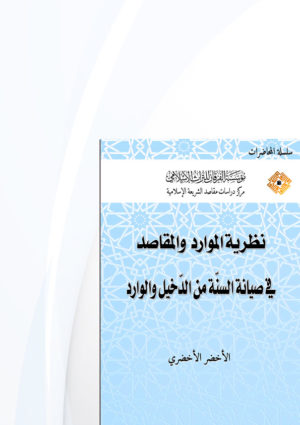“The Theory of Resources and Objectives of Preserving the Sunnah from the False and the Alien”, by Dr Al-Akhḍar al-Akhḍari
On the eve of the Second Course on “The objectives of Shariʿa in the light of Sunnah: The Methodology of revealing and applying the Shariʿa Objectives via the Prophet’s Sunnah”, a public lecture titled“The theory of resources and objectives of preserving the Sunnah from the false and the alien”, delivered by Dr Al-Akhḍar al-Akhḍari, took place on Tuesday 23rdApril 2019, in Dean Muhammad al-Kittani Hall at the Faculty of Arts and Humanities, University of Abd al-Malik al-Sa’di Saʿdi - (Tetouan), Morocco.
The lecture was attended by representatives of the Al-Furqan Foundation, including Mr. Sali Shahsivari, the Managing Director, and Mr. Mohamed Drioueche; representatives of the Al-Maqasid Center for Studies and Research, including Dr. Hussein Al-Mous, Deputy Director, and Dr. Muhammad Awwam; a group of professors from the Department of Islamic Studies at the Faculty of Arts in Tetouan, including Dr. Mustafa Al-Maktouni, Dr. Muhammad Al-Ṣamadi, Dr. Abd al-Wahid Bushdak and Dr. Hisham Tahtah; and around 120 PhD and Masters students.
This event started with a recitation from the Holy Quran, followed by welcoming speeches presented by Dr. Abdul Wahid Boshdak,on behalf of the Islamic Studies Department; Mr. Sali Shahsivari, on behalf of Al-Furqān Foundation; and Dr. Hussein Al Mous, on behalf of the Al-Maqasid Center . After that, Dr Akhdar al-Akhḍari delivered his lecture.
Dr al-Akhḍari began by explaining the correlation between documenting the various sciences in different successive epochs, whether good or corrupt; and how the body of rulings grow depending on the collective temperament of the people and alternating between modest and tyrannical. This, Dr al-Akhḍari pointed out, necessitates the combination of these scattered rulings into complete works, and the authentication of these rulings based on the guiding principles, even if there was no partial witnessed evidence against the judged or the sentenced, as the negation of the particular does not require the negation of the general.
He emphasized that the authenticity of the Qurʾān was bound to a nation of illiteracy that was not affected by the ambiguity of eloquence nor that of inference. This authenticity could maintain itself due to the fact that it stands on facts about the universe and the legislative ones. Other reasons for this sustainability are the customs, methods and traditions which were decreed during the time of revelation. Dr. al-Akhḍari also emphasized that the observer of the history of legislative discourse can undoubtedly confirm the clarity of the minds of the perceivers and the vastness of their imagination in such a way that we found not a single companion returning to the Messenger of Allah peace be upon him in order to understand something of the Qur’an, except in the places referring to Divine concealments or authorising explanations.
Dr al-Akhḍari pointed out that the successive occurrence of judgements by time creates the need to canonize the methodological and deductive axioms in order to refute misconceptions. Thus, the codification of the Sunnah - after the first Muslim generation - and the protecting of both its texts and chains of narrators from any impurities was a vital task undertaken by rulers and scholars. The non-codification of a certain tradition of the Prophet, he added, did not mean that it never existed; for being unperceived does not mean non-existent. He then stressed the significance of deductive methodologies from the Sunnah of the Prophet, and the presentation of the intended Objectives through their Qurʾanic evidence and the efforts of the early elite. In this regard, he spoke about documentation of narrated sayings and practices according to the doctrines of the school of Hadith.
Then, Dr. al-Akhḍari talked about the academic efforts exerted in the service of the Sunnah according to the following levels:
First: the efforts of Hadith scholars
The scholars of Hadith paid enormous attention to the Prophetic narrations (in terms of adding grammatical indicators - ‘harakat’, editing, and contextual occasions), in terms of acceptance or rejection, and how the scholars selected the keywords that reflect the objectives and the occasions.
Second: the efforts of Usul scholars:
Dr al-Akhḍari covered this point extensively. First, he highlighted the variation of the terminology and methodology in approaching the Sunnah. He praised the scholars’ utmost care in dealing with both Hadith chains and texts, and reviewed the various conditions laid down by them in order for narrations to be accepted. He then discussed the Zahiri, Hanafi and Maliki methodologies in detail.
Thirdly: Maqasid (Objective) Approach:
Dr. al-Akhḍaridescribed this approach, and how it takes the scholar from the realm of acquiring knowledge to that of applying it, where the scholar is equipped with the legal methods to achieve what he aims for.Thus, these methods fulfil their functional objectives as they honour themselves and honour those who fulfil them.
In this regard also, Dr. al-Akhḍari spoke of the ways to infer the objectives according to al-Shaṭibī, Muhammad al-Ṭaher Ibn ʿAshour, and others. These ways are:
a. Tools of exploration (Arabic language, customs, reasoning, acquaintance through coexistence, acts of devotion)
b. Socially accepted customs
c. Total Descriptions.
d. Rating and occasions.
e. Features of excellence.
Then Dr al-Akhḍari explained the Maqasid methodology of Sunnah classification, which is a novel, useful and interesting approach consisting of:
- the extraction of partial Maqasid, by using tools of exploration.
- gradual progression to ultimate Maqasid.
- arranging of Maqasid books and topics.
Among the topics proposed by the lecturer (the Objective of Protection, Motivational Objective, the Objective of Property Preservation, the Objective of Reconstruction, the Objective of Fulfillment of Oaths, the Objective of Honoring Rituals and Laws...). The first objective (i.e. the Objective of Protection) was chosen to elaborately demonstrate the rearrangement of Sunnah according to the classification method of Maqasid, as he broke it down into clear entities and chapters that corresponds to how it was practiced through the noble hadiths.
The lecture lasted about an hour and a half, and was followed by an open discussion, in which, both teachers and students took part
Eventually, this scholarly assembly closed with a sincere expression of profound thanks and praise to all who made it a success: the organizers, Al-Furqan Islamic Heritage Foundation, and the Faculty of Arts and Humanities at the University of Abd al-Malik al-Saʿdi, in Tetouan - Morocco, the speaker and other distinguished professors and students researchers.
Related Video


